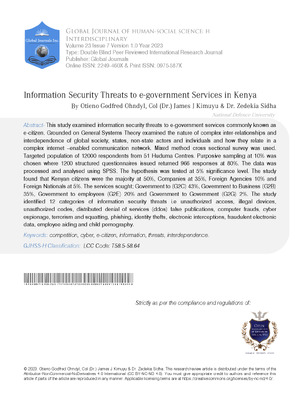Information Security Threats to e-government Services in Kenya
Keywords:
competition, cyber, e-citizen, information, threats, interdependence
Abstract
This study examined information security threats to e-government services commonly known as e-citizen Grounded on General Systems Theory examined the nature of complex inter-relationships and interdependence of global society states non-state actors and individuals and how they relate in a complex internet enabled communication network Mixed method cross sectional survey was used Targeted population of 12000 respondents from 51 Huduma Centres Purposive sampling at 10 was chosen where 1200 structured questionnaires issued returned 966 responses at 80 The data was processed and analysed using SPSS The hypothesis was tested at 5 significance level The study found that Kenyan citizens were the majority at 50 Companies at 35 Foreign Agencies 10 and Foreign Nationals at 5 The services sought Government to G2C 43 Government to Business G2B 35 Government to employees G2E 20 and Government to Government G2G 2 The study identified 12 categories of information security threats i e unauthorized access illegal devices unauthorized codes distributed denial of services ddos false publications computer frauds cyber espionage terrorism and squatting phishing identity thefts electronic interceptions fraudulent electronic data employee aiding and child pornography
Downloads
- Article PDF
- TEI XML Kaleidoscope (download in zip)* (Beta by AI)
- Lens* NISO JATS XML (Beta by AI)
- HTML Kaleidoscope* (Beta by AI)
- DBK XML Kaleidoscope (download in zip)* (Beta by AI)
- LaTeX pdf Kaleidoscope* (Beta by AI)
- EPUB Kaleidoscope* (Beta by AI)
- MD Kaleidoscope* (Beta by AI)
- FO Kaleidoscope* (Beta by AI)
- BIB Kaleidoscope* (Beta by AI)
- LaTeX Kaleidoscope* (Beta by AI)
How to Cite
References

Published
2023-11-27
Issue
Section
License
Copyright (c) 2023 Authors and Global Journals Private Limited

This work is licensed under a Creative Commons Attribution 4.0 International License.